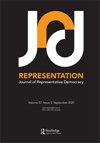‘A Passionate Clarity’: David Beetham on Democracy, Legitimacy and the Democratic Audit
Q2 Social Sciences
引用次数: 0
Abstract
All who examine and puzzle over the ideas and practices of democracy, in the UK and well beyond, owe much to the scholarship and leadership of David Beetham (19382022) – a long-serving member of the Editorial Advisory Board of Representation – over several decades. In this short article, we discuss and appreciate key parts of David’s contribution to advancing our understanding of democracy, representation, rights, and more. In a short book published as a ‘Beginner’s Guide’ to democracy, Beetham (2005, p. 161) described his involvement with an ‘organisation or network called Democratic Audit’. The aim, he explained, has been to ‘develop a method and a framework which can be used by citizens of any country to audit their own democracy. The point of such an audit is to identify the most significant strengths and weaknesses as a contribution to reforming and strengthening the democratic process’. With Stuart Weir and others, David published two Democratic Audits of the UK (Beetham et al., 2002; Beetham & Weir, 1999). He was also closely involved with several of the audits in 24 other countries. Perhaps the ‘go to’ publication for anyone seeking to understand the continuing value of the Audit is Assessing the Quality of Democracy: A Practical Guide (Beetham et al., 2008). In 314 pages, the Practical Guide justifies the Audit as a framework and method of democracy assessment and compares it to other methods of assessing democracy. It discusses the strengths and weaknesses of different data sources in evaluating different aspects of democracy, and draws lessons from experiences from audits around the world. Despite the admirable clarity of its standards, some might feel that the Audit starts out from a needlessly complex understanding of democracy. Why not just assess democracy as a simple competition for the people’s vote (Schattsneider, 1960)? Anything much more, the democratic realists tell us, gets democracy into trouble by pursuing unattainable ideals. In contrast, a form of government with periodic opportunities to throw the rascals is not only possible, but is also a remarkable development compared to the dismal ways in which humans have been governed for most of their history. So why does assessing democracy require much more than free and fair elections; rights needed for free and fair elections and rascals who are prepared to accept being thrown out? The answer, in David’s view, was that even indicators based on rights, competition and inclusiveness – a combination that had become ‘standard’ since Dahl (1971) – failed to《激情的明晰》:大卫·比瑟姆谈民主、合法性和民主审计
在英国和其他地方,所有对民主理念和实践进行研究和困惑的人,都在很大程度上归功于戴维·比瑟姆(David Beetham, 1938 - 2022)几十年来的学术成就和领导才能,他是英国编辑顾问委员会(Editorial Advisory Board of Representation)的长期成员。在这篇简短的文章中,我们讨论并欣赏大卫对促进我们对民主、代表权、权利等的理解所做贡献的关键部分。在一本名为“民主入门指南”的小书中,Beetham(2005年,第161页)描述了他参与一个“被称为民主审计的组织或网络”。他解释说,其目的是“开发一种方法和框架,任何国家的公民都可以使用它来审查自己的民主。”这种审计的目的是确定最重要的优点和缺点,作为对改革和加强民主进程的贡献。”David与Stuart Weir等人一起出版了两本《英国民主审计》(Beetham et al., 2002;Beetham & Weir, 1999)。他还密切参与了其他24个国家的几项审计。对于任何想要了解审计持续价值的人来说,也许“去”的出版物是评估民主的质量:实用指南(Beetham等人,2008)。在314页的《实用指南》中,证明审计是评估民主的框架和方法,并将其与其他评估民主的方法进行比较。它讨论了不同数据来源在评价民主的不同方面的长处和短处,并从世界各地的审计经验中吸取教训。尽管审计的标准清晰得令人钦佩,但有些人可能会觉得,审计是从对民主的不必要的复杂理解开始的。为什么不把民主看作是人民投票的简单竞争呢(Schattsneider, 1960)?民主现实主义者告诉我们,任何超出这个范围的事情,都会因为追求无法实现的理想而使民主陷入困境。相比之下,与人类历史上大部分时间被统治的悲惨方式相比,一种定期有机会把流氓赶下台的政府形式不仅是可能的,而且是一种显著的发展。那么,为什么评估民主需要的远不止自由公正的选举?自由公正的选举所需要的权利和准备接受被赶出去的流氓?在大卫看来,答案是,即使是基于权利、竞争和包容的指标——自达尔(1971)以来已经成为“标准”的组合——也未能实现
本文章由计算机程序翻译,如有差异,请以英文原文为准。
求助全文
约1分钟内获得全文
求助全文
来源期刊

Representation
Social Sciences-Sociology and Political Science
CiteScore
3.50
自引率
0.00%
发文量
31
期刊介绍:
This change in scope follows two paths. Firstly, it seeks contributors who are interested in exploring the interface between democratic practice and theory. In particular, this focus seeks contributions that apply theoretical insights to actual examples of current practice. Secondly, while not neglecting the current focus of the journal, we would like to expand its international coverage so that the journal will offer our readers insights in the state of democracy worldwide.
 求助内容:
求助内容: 应助结果提醒方式:
应助结果提醒方式:


